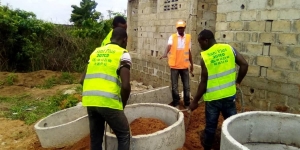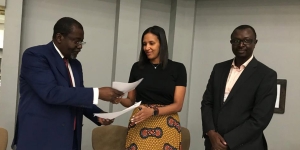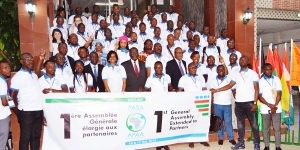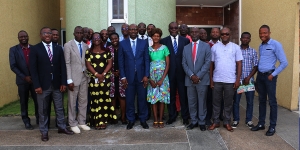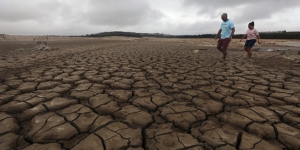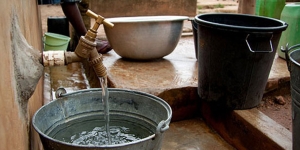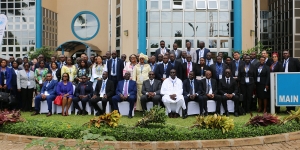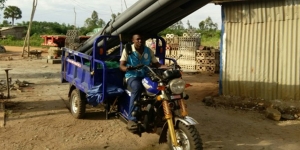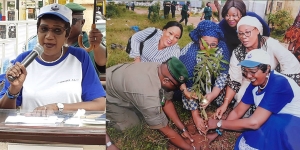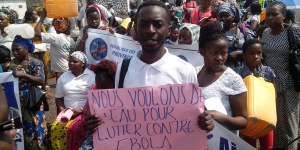Nzickonan Stéphanie
Sani Plus: a new field of possibility for Tibus Kouadio
Engineer in Building and Public Works techniques, Tibus Kouadio is the Managing Director of a construction service company. With a staff of 25 employees, he designs architectural plans, carries out technical feasibility studies and supervises construction sites.
Indeed, business was going well enough for him. One of the projects he carried out provided him with nearly 20 million in profits. Suddenly, everything stopped. Markets have become increasingly rare. A set of difficulties that led him to the crisis forcing him to lay off to keep only 5 positions. Unable to bear the maintenance costs, Tibus is also forced to resell the 4 public transport vehicles he owned.
As part of market development activities, the USAID-funded Sanitation Service Delivery Project (SSD) is working with city councils to establish a supply chain. The objective of the project is to train and engage the private sector to provide sanitation services to low-income households through commercial provision. "Sani Plus" is a brand of quality and low-cost sanitation products created by the project.
Going to Abobo City Hall for an administrative formality, Tibus discovers on a bulletin board, the call for proposals of the SSD project to recruit VSEs interested in sanitation marketing. "I thought to myself why not try," he said.
A few months after his training on the construction of Sani Plus sanitation products, Tibus said he was impressed by the level of quality with which the works are carried out. For him, the process used to make a lost well with concrete nozzles is quite innovative.
A rigorous worker, respecting the quality standards of the Sani Plus brand, Tibus has begun to make a name for itself in the sanitation marketing sector. He was doing more and more works. Although the revenues generated by the sale of Sani Plus products were quite lower than the costs of building large real estate projects, Tibus did not give up. "I would rather earn a little bit every day than win big once and have nothing left after that," he continues.
This''Sani Plus'' contractor currently has at least 115 sanitation facilities (toilets, septic tanks and cesspools) built in the municipality of Abobo. This generated a turnover of more than USD 19,000. In addition, Tibus has created a second company exclusively dedicated to the Sani Plus sanitation products business. This company employs 7 full-time young graduates whose salaries are financed through the sale of sanitation products. According to him, the money generated by the sale of Sani Plus sanitation products is very useful to him. "Often I take Sani Plus' money to do bidding on public contracts, and that helps me a lot," concluded Tibus Kouadio.
Speak Up Africa and AfWA form partnership to advance sanitation agenda and improve access to clean water across Africa
Speak Up Africa, a Policy and Advocacy Action Tank, and the African Water Association (AfWA), a continent-wide platform that brings together organisations in the water and sanitation sector, are pleased to announce a formal partnership. This partnership will support the implementation of the African Water Vision for 2025 and promote knowledge sharing on the African water and sanitation sector.
The two organisations signed a memorandum of understanding (MoU) on the margins of the Bill & Melinda Gates Foundation’s Water, Sanitation & Hygiene partners meeting in Lusaka, Zambia last month.
Through close collaboration, this agreement will see both partners further engage key stakeholders on issues in the water and sanitation sector. Furthermore, AfWA and Speak Up Africa will align their activities by sharing expertise and communication resources for even greater impact.
Côte d’Ivoire: The Pan-African Association of non-sewer Sanitation Operators (PASA), organizes its first General Assembly and launches the initiative “one city, one faecal sludge treatment plant”
The first Annual General Assembly of the Pan-African Association of non-sewer Sanitation Operators (PASA), was held in Abidjan, Côte d’Ivoire from 15 to 17 October 2019. This meeting, which was intended for coordination, orientation and monitoring the implementation of the PASA action plan, brought together about fifty representatives of African Emptier Associations and partners.
During two (2) days, the sanitation operators discussed about the situation and needs of sewerage service in each of their countries, including the assessment of the implementation of every association action and came to an agreement on what the APAA expects from governments and partners.
During the opening of the meeting, the President of APAA, Mr Ibra SOW urged his peers to focus on action: to act in order to address the issue of outdated equipment in order to promote better quality services, widespread use of mechanical collection, formalization of operators to ensure that there are faecal sludge treatment stations in all the cities across Africa,. He expressed his conviction that the General Assembly will be the trigger mechanism for a better future in the sector of sanitation.
For his part, Mr Sylvain Usher, the Executive Director of AWA indicated that he appreciated the testimonies given by the emptiers themselves and how through the Association, their activities which were previously frowned upon, have now generated interest in their different countries as they have been associated with projects concerning improvement in sanitation. He urged them to move forward to ensure improve sanitation sector in Africa.
Mr Aka Lambert, representative of the Minister of Sanitation and Hygiene, announced the will of the Ministry to assist Ivorian emptiers and to PASA in general.
The participants believed the meeting had been an enriching one. The discussions held by the peers had made them understand a new reality prevailing in other countries; this would help them to adjust their action plan and to have the necessary responses to address the challenges in their respective countries. They expressed the desire that meetings of this nature should be organized regularly to ensure that all the countries achieve progress together.
The General Assembly of PASA ended with the launch of the initiative “One City, One Faecal Sludge Treatment Plant”.
The Pan-African Association of non-sewer Sanitation Operators was set up on 17 February, 2019 in Cape Town, South Africa, on the sidelines of the AfricaSan5/FSM5 International Conference.
Côte d’Ivoire: Sanitation Operators Establish Toilets for All Association
Côte d’Ivoire now has a National Toilets for All Association (ANT-CI). The constituent general Assembly was held on Wednesday 30 October 2019 at the premises of the National Corporation for Sanitation and Drainage (ONAD), with the Director General of this national entity also in attendance including the Executive Director of the AfWA. At the end of the elections, Ms. Sié Julienne, Hydraulic Engineer at ONAD, was elected from among her peers to lead the Association for a 3-year term of office.
ANT—CI emanates from the World Toilet Organization, founded in 2001 and which aims at forming a network of all health and sanitation organizations in order to share the know-how, to exercise its visibility in the media and lobby governments for the implementation of more effective public health and sanitation policies. Indeed, according to the 2017 WHO-UNICEF Common Monitoring Programme for Water Supply and Sanitation, about 60 % of the world population, representing 4.5 billion people do not have toilets in their houses; or they have toilets but faecal matter cannot be hygienically managed and 892 million people in the world practise open defecation since they do not have toilets. The faecal matter is therefore not collected nor is it treated.
To contribute to mitigating this state of affairs and promote access to toilets for all, the Scientific and Technical Council of the AfWA, through its Specialized Committee in charge of Sanitation, has encouraged its members to set up National Toilets Associations in their countries. Thus, the one in Côte d’Ivoire has been established within a local context marked by 22% of the total population, or 3.5 million people engaged in open air defecation (MICS, 2016) . Thus, the ANT hopes to contribute to the government’s goal of totally eradicating open air defecation in urban centers and to curb it in the rural communities from 51% to 15% by 2030. The new Chairperson of ANT thanked her peers for electing her and appealed for unity among the stakeholders in the sanitation sector in order to achieve the goals set by the Association.
Water Crisis : the warning from South Africa (By Vivian Forson)
Whereas climate change is causing torrential rains in some regions of Africa, it is the source of persistent drought in the southern part of Africa. (By Vivian Forson)
After three years of water shortage, the situation at the end of summer 2017-2018 (last winter in the Northern Hemisphere) reached a critical level in Cape Town (South Africa).
While addressing the media last Monday, the South African Minister for Housing and Water Resources, Lindiwe Sisulu, tried as much as possible but weighed each of her words: Objective: not to create any panic. All the same, the situation is serious. South Africa is facing an unprecedented water stress, after an unusually hot and dry summer, a lower than average rainfall and an increase in water consumption. The levels of dams throughout the country have fallen by between 10 and 60% compared with 2018 levels, according to a recent report issued by the Department of Water Resources.
Worst drought in history
“Rainfalls are more and more difficult to predict. What we have seen, as compared to other regions of the world, is that the dry season has become longer, harsher and more intense. “Climate change is real and it is affecting South Africa”, explained the Minister, cited an AFP source. But access to water depends on three distinct but interdependent factors. The first and the most obvious is the level of rainfall. The second is the design of the water distribution systems and the third is the way people react when there is shortage. To avoid the worst, the authorities have decided to take the lead. “We are working hard to avoid the fearful phenomenon of zero day and we have therefore announced water supply restrictions”, Lindiwe Sisulu ended up by admitting after a long face to face with the media. Officially, the South African authorities have imposed restrictions on water in the major cities of the country. Outcome: several zones from the center to the north of the country have been without water in the last few days whereas South Africa is confronted with a heat wave. This scenario reminds us of what happened last year in Cape Town, at the south-western tip of South Africa, with 4 million inhabitants. In 2018, the city narrowly escaped the zero day after drastic water restrictions then in force. According to Garth Sampson, spokesperson of the South African Meteorological Office in Port Elizabeth, “we must pass on the message. It is terrible. This will not go away. Several records have been broken”.
Cameroun : about USD 30 400 000 will be invested to provide 60 villages with potable water by 2020
(Agence Ecofin) – During the year 2020, the water supply and rural sanitation project will initiate work for the supply of potable water to 60 villages in Cameroon, according to sources, during the first session of the steering committee of this government project.
The project, worth about USD 305,000 will assist in building 80 water towers with an overall capacity of 8900 cubic meters, 995 standpipes, laying of 242 kms of pipelines. The installation of solar panels in the pumping stations has also been envisaged under the project.
This project which will cover a period of 4 years will contribute to the improvement of access to potable water in Cameroon, which resource is only 45% available in the rural communities as against about 77% in the urban areas, according to the figures conducted by the National Statistical Institute (INS) in 2018.
Access to water and sanitation on the continent: some experts explore the path to a circular economy
"The relevance of the circular economy in accelerating access to water and sanitation for all in Africa” is the theme under which AfWA STC’s 83rd sessions will be held from November 11 to 14, 2019 in Kampala – UGANDA.
Presided over by Dr. Chris EBAL, the board chairman of NWSC of National Water and Sewerage Corporation, the opening ceremony featured a series of messages related to the theme of the meeting. First, Eng. AMAYO Johnson, on behalf of Dr. Eng. Silver MUGISHA, NWSC Managing Director, thanked AfWA for choosing this theme in the sense that "we live in an environment where resources are scarce in quantity and quality while the population is growing. The use of the circular economy becomes an alternative because it emphasizes recovery and recycling" and will make resources available”.
For Mr. Sylvain USHER, AfWA’s Executive Director, "The relevance of the circular economy for access to clean water and sanitation for all in Africa." The circular economy is an opportunity for renewal, growth and stability, it is a model of the future that we must seize to win our fight for access to water and sanitation in Africa.
In his turn, Dr. Papa SAMBA, President of STC said, while many sustainable development models revolve around the concept of "doing more with less", the circular economy includes the notion of recovery. Wastewater is now considered, in agricultural use, as waste that can be reused with the many nutrients it contains. We should also consider how to improve water cycle management by securing collection and treatment facilities and infrastructure; limiting or even reducing pollution sources to zero; and controlling urban, industrial and agricultural water runoff by combating macro and micro waste on the coast and at sea. In a spirit of global efficiency and circular economy, it is logical that wastewater recovery should complement the initial tasks of sanitation. Regarding sanitation in particular, it may be necessary to increase the initiatives already under way in the field of non-collective sanitation: Collect, transport, treat, recycle and recover by-products. Lastly,
Dr. Chris EBAL, the board chairman of NWSC said that “People are aware that water is a human right that cannot be discussed. “The Relevance of Circular Economy in achieving access to safe water and sanitation for all in Africa”, is chosen as a topical issue that transcends the African continent and is suited to the current world-wide challenge of achieving the SDGs. It is for that reason that we in Uganda chose the slogan “water for all”, reflecting our desire to see that more citizens have access to improved services”.
It should be noted that during the opening ceremony, Uganda's water and sanitation sector was presented to delegates.
PAUL, THE KING OF TOILETS "MIMIN" IN BENIN
A young entrepreneur living in Benin, Paul Kpadonou has always dreamed of becoming a successful businessman. Paul, 30, started his professional career selling shrouds and garden decorations on the side of the highway in the municipality of Abomey Calavi.
During a campaign to promote the "WC Mimin" brand in his neighbourhood, Paul was seduced by the new product presented: innovative toilets that eliminate bad smells and prevent the presence of insects. "I understood that this product would make many people happy, because the traditional toilets used by households are full of insects with nauseating odours," he said. Indeed, access to toilets remains a major problem in Benin. According to the 2018 National Health Survey , only 22% of the urban population uses basic sanitation facilities, while 26% of Beninese use shared toilets and 38% practice open defecation. "Wc Mimin" is a latrine brand created as part of the Sanitation Service Delivery (SSD) project activities. An urban sanitation service delivery project funded by USAID. This project aims to facilitate household access to sanitation products by training private sector micro-sanitation entrepreneurs to provide these services.
Enthused by the prospect of helping to improve public health in his community, Paul became interested in the SSD project to benefit from the production tools as well as the entrepreneurs who had been pre-selected. Unfortunately because it was installed a little too close to an affiliated contractor, the project team decided not to integrate it into the model in order not to create unfair competition. However, Paul was not discouraged. He turned to the entrepreneurs involved in the SSD project to learn more about their work so that he too could build latrines. A few weeks later, Paul quickly became an expert in the construction of Mimin toilet toilets.
Determined to succeed, this young businessman drew inspiration from one of the mould models borrowed from an entrepreneur to make his own. Now with its own production facilities, it has started the large-scale installation of latrines by personally advertising to households.
To attract more customers, young Paul built a model of a "Mimin" latrine in his home and offered its use for free. A process that has attracted many curious people. The message quickly spread to the community and made him the King of toilets in Abomey Calavy. Thus, after 18 months of activities with the SSD project, Paul built and installed 1380 WC Mimin toilets for a turnover of more than 60 million CFA francs and a profit margin of more than 11 million CFA francs.
THE PROFESSIONAL WOMEN IN WATER AND SANITATION OF MALI DEVOTE A MORNING TO ORGANIZE A TREE PLANTING EVENT IN BAMAKO
Aware of the devastating impact of climate change on Mali's ecosystem, the Malian Network of Professional Women in Water and Sanitation (REMAFPEA) aims to contribute to the protection of the people's living environment. In this regard, it organized a “green morning” as part of the annual national reforestation campaign to maintain the vegetation cover in urban areas in public spaces such as schools, town halls, parks, etc.
This activity had four main objectives. For women working in water and sanitation, the aim was to contribute to the greening of public spaces in urban areas and enhancement of our local flora, to encourage neighborhood populations to plant in order to preserve the environment, and to monitor the process from planting to the growth of the planted trees.
This tree planting session was organized with the support of the network's Honorary President, Her Excellency Mrs. Keita Aida M'bo, former Minister of the Environment, who generously donated hundreds of feet of Ficus Jica variety trees to the network. REMAFPEA in collaboration with the National Water and Forests Directorate and the City of Bamako carried out this activity. The Garden of Eden of Baladabougou in Commune V of the district of Bamako was chosen to further embellish its natural landscape (floral and vegetal). One hundred and fifty feet of trees were planted in the Garden of EDEN.
REMAFPEA women do hope that by the end of that morning, the residents will have been won by the desire to devote a little of their time to preserving the environment by planting trees.
DRC: YOUNG PROFESSIONALS PARTICIPATE IN A PEACEFUL MARCH TO DEMAND WATER IN ORDER TO BETTER FIGHT EBOLA
On 6 September 2019, a peaceful march was organized in Goma by a few civil society organizations. The ''Young Professionals in Water and Sanitation of DRC'' actively took part in this march organized with the objective of advocating with the Congolese authorities to better fight against the Ebola virus disease.
The first case of Ebola was reported in Goma in mid-July 2019, the large city in the eastern part of the Democratic Republic of Congo, a city of more than one million inhabitants. This is the second deadliest Ebola epidemic in African history, after the 2013-2014 outbreak in West Africa (Guinea, Liberia, Sierra Leone).
A golden rule to avoid the spread of Ebola is washing your hands regularly. Yet finding water is a major headache in Goma. The distribution network managed by the public operator, REGIDESO, covers only half of the water needs of the city's inhabitants."We are marching today because too much is too much; we are suffering, the people have been demanding water for several years. Today Ebola is here, we want our march to challenge the authorities. During this dry period, our mothers wake up very early in the morning with all the possible risks to fetch water from Lake Kivu, which is why we want to question our authorities again and especially because we already have new leaders," said Passy Mubalama, one of the demonstrators and organizers of the march.
From the Signers roundabout in the municipality of Karisimbi, the demonstrators (young water professionals, women from the city of Goma and the territory of Nyiragongo) with banners and bands mobilized to head for the provincial governorate where they submitted a memorandum with their complaints. The following few sentences can be read in the memorandum addressed to the governor of North Kivu province : "We ask to ensure that the rights of citizens are respected, to deliver on your promise to us, the population, to personally invest in the fight against Ebola by giving drinking water to the population".

 English
English  Français
Français 
